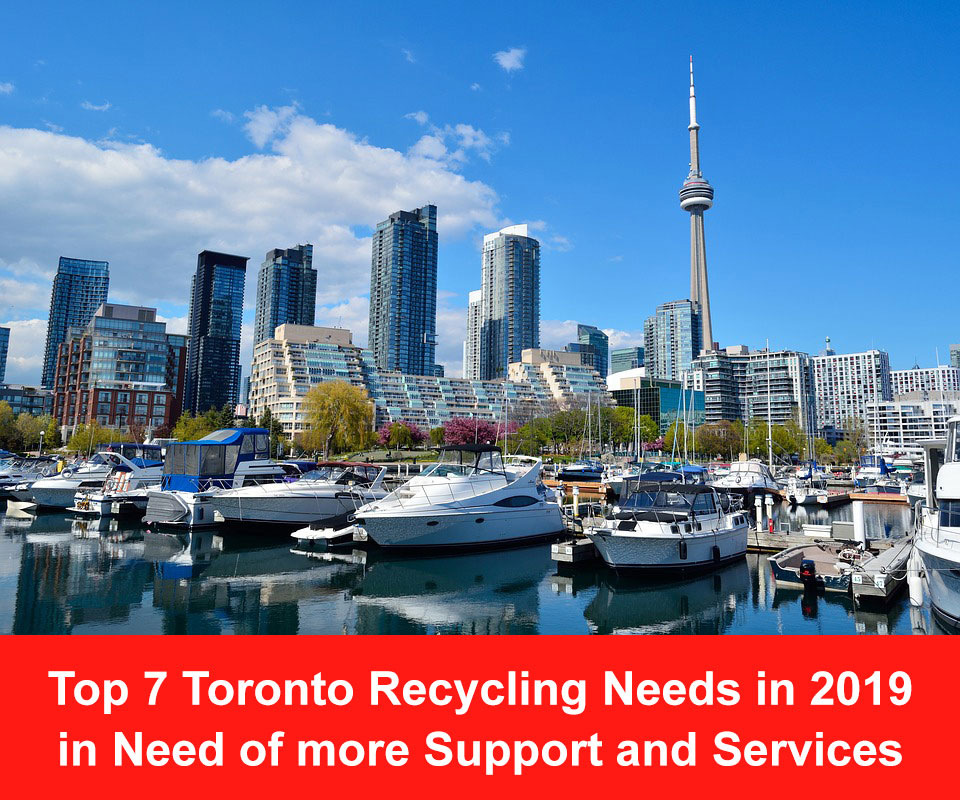Top 7 Toronto Recycling Needs in 2019 in Need of more Support and Services

Toronto has a wide variety of recycling needs, ranging from residential to commercial and industrial. Here are the top 7 recycling opportunities in the GTA we continue to come across, oftentimes requiring more support and services than what local infrastructure provides.
Retailers and offices.
Small businesses, corporate offices, and retailers create sizeable amounts of waste every day. Convenient, secure, and economically viable recycling solutions are integral to ensuring no recyclables end up accidentally or purposefully in the trash.
Restaurants and hospitality.
Toronto has no shortage of restaurants, hotels, and hospitality-based businesses. Their recycling programs oftentimes focus on collecting food waste and compostable materials. A lot of recycling from restaurants also come from organics, paper and cardboard, newspaper and magazines, bottles and cans, batteries and lights, and electronics.
Events and festivals.
Every weekend, Toronto throws at least a half-dozen festivals or events of some kind. We’re not even considering the hundreds of events hosted throughout the week. Community events can challenge the ability to tackle trash however as big or small a setting may be, recycling efforts can still be prioritized.
Electronic waste or e-waste.
Electronic waste is one of our biggest concerns when it comes to recycling in Toronto. After all, each one of us has a smartphone and uses several electronics throughout the day. When the lifespan of an electronics device is used up, it usually gets tossed in the trash. That said, there’s so much recyclable materials in e-waste. It’s time the city better educates themselves on how to process electronic waste.
Condos or apartment buildings.
Multi-unit apartment buildings, mixed-used commercial buildings, and any of the dozens of Toronto condo developments all should have a recycling program in place for both organics as well as non-organics. These buildings can produce high amounts of paper, cardboard, bottles and cans, plastic containers, food scraps, and electronics – most of which can be recycled.
Confidential shredding.
If you’re a corporate office or a small business with confidential information in their possession, chances are you want to ensure everything’s shredded before it gets sent off to a recycling processing plant. Thankfully, this is one area of recycling businesses can either do themselves or connect with a company who is willing to shred large quantities of documents.
Residential organics.
Although Toronto is doing a lot of promising work in residential organics, including in building a recycling processing plant that will turn organics into energy, there’s more we could be doing. Food waste and compostables make up as much as 40 percent of Toronto’s waste stream. Organics include food waste, yard trimmings, and compostable products such as takeout containers and cutlery.
A lot of Toronto’s recycling needs are either being met already or are building a supportive infrastructure to ensure they’re met shortly in the future. If your residential home, industrial site, or commercial space does not have a defined waste management or recycling plan in place, contact a representative at Core Mini Bins today. We can help in reducing waste, improve recycling, and implement a plan to maximize your property’s potential. A comprehensive recycling plan that prioritizes landfill diversion can improve your company’s recycling record and give you something else to brag out! Contact Core Mini Bins to get set up with a program.


